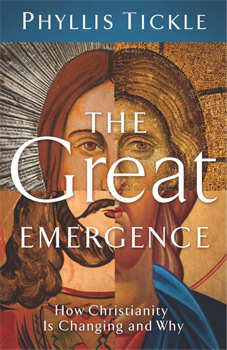Phyllis Tickle: The Great Emergence
 Phyllis Tickle, The Great Emergence: How Christianity Is Changing and Why (Grand Rapids: Baker, 2008), 173 pages, ISBN 9780801013133.
Phyllis Tickle, The Great Emergence: How Christianity Is Changing and Why (Grand Rapids: Baker, 2008), 173 pages, ISBN 9780801013133.
Chances are you have heard of Phyllis Tickle. As the founder of the religion department of Publishers Weekly, the author of at least two dozen books, and a popular speaker on religion in America, Tickle’s latest work has been widely anticipated. The Great Emergence takes on the broad task of chronicling church history, arguing that Christianity changes just about every five hundred years. She outlines the stages of development leading up to the present transformation and then sets her sights on the future of the church. Her main concern is not with the so-called “Great Emergence” but rather with Christianity in North America and the implication of the insight that twenty-first-century Christians in North America are facing the church’s most recent giant rummage sale. The results of this event are three-fold: first, a new, and more vital form of Christianity emerges; second, the dominant organizational framework of Christianity is reconstituted into a more pure form; and third, the Christian faith spreads dramatically as a result of the transformation. This description essentially summarizes the argument of the book.
Tickle’s argument is not unusual. Major shifts and periodic events have been the subject of other writers. Consider, for example, the widely popular work of Thomas Kuhn on the nature of scientific revolutions, or the work of Philip Jenkins on the next Christendom. The Great Emergence lacks much of the depth of these and other works. Tickle offers no detailed dialogue with any historical period or theological argument, no footnotes, no bibliography, and shows little desire to justify her observations. The chief reason may be that she does not have to do so: the argument is correct. Tickle is right: The church is facing its own coming to be in yet another shape and form.
Tickle’s book is short and to the point. Highly readable, as all of her work, The Great Emergence can easily hold your interest throughout any of the seven chapters. The book consists of three major parts: (1) a description of the nature of the great emergence, (2) a historical account of its origins, and (3), a prospectus of the future of the great emergence. However, it seems that despite the descriptive nature of most of the chapters, the heart and soul of the book is not in the content but in the idea it seeks to present: a shift in the patterns that define the profile of the church. Essentially surrounded by four primary forces, conservatives, liturgicals, social justice Christians, and renewalists, the center of Christianity is constantly shifting, and the contours of a new emerging center are already forming. Tickle suggests that the most significant alteration to be expected is the emergence of Christianity as a movement that places all authority in the existing center in order to accommodate the massive changes in the church and in culture.
Category: Ministry, Spring 2010


